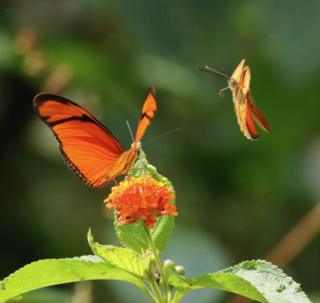

Image copyright
Frank Gardner


Colombia’s tropical rainforests have been disappearing fast. Since the 2016 peace deal between the government and the Farc guerrillas much of the virgin jungle that was previously off-limits due to conflict has now been chopped down, destroying entire ecosystems. But now efforts are under way to save what’s left.
Earlier this year, and just before the coronavirus lockdown, I joined an expedition of top botanists from the Royal Botanic Gardens at Kew in London into previously unexplored rainforest in the Serrania de las Quinchas, as they searched for rare plant species, some of them unknown to science.
Colombia is the second most bio-diverse country in the world after Brazil. It also has more bird species – 1,958 at latest count – than any other country.
If there were a game of Top Trumps for hummingbirds then Colombia would win hands-down. With its mountains, jungles and rainforests, this large South American nation boasts some of the world’s most colourful flora and fauna. Here is a small sample of what we saw.
Image copyright
Frank Gardner
Travelling on horseback was the only way for me, being wheelchair-based, to get over the rough terrain. Conservationists are hoping this largely safe and unexplored part of Colombia could, with better access, become a prime destination for eco-tourism.
Image copyright
Frank Gardner
We spent the night here, on hammocks and mattresses. The farmer who lives here alone is completely self-sufficient, rearing his own cattle and pigs but also growing a type of root vegetable for food, which the scientists say they had never seen before.
The week before we arrived his son was bitten on the foot by a venomous fer-de-lance pit viper in the nearby forest. The farmer had to carry him on his back to the nearest road and they just got him to a hospital in time to save his leg from having to be amputated.
Image copyright
Frank Gardner
A tiny and surprisingly tame bird that lives up to its name. Its beak here was stuffed with insects it had just caught. It was a familiar sight in the trees around the palm-thatch hut we slept in and one of the first birds to wake us up with the dawn chorus. (Note: nothing remarkable about this species, it was just rather pretty.)
Image copyright
Frank Gardner
One of the most aggressive and territorial of Colombia’s 165 hummingbird species, it is known to attack other birds and insects that it sees as intruders. At night it goes into a resting torpor to replenish its high levels of energy.
Image copyright
Frank Gardner
This is one of 18 different hummingbirds to be found high in the hills above Bogota at the Observatorio de Colibríes, where visitors can watch them flitting through the branches while eating breakfasts of mango, papaya and strong Colombian coffee.
Image copyright
Frank Gardner
This terrifying insect has one of the most painful stings known to mankind, even worse than the Bullet Ant and Asian Giant Hornet. One of the largest neotropical wasps at 3cm in length, its name literally means “meat-maker” as it chews up its prey before ferrying it back to the nest.
The TV naturalist Coyote Peterson volunteered to be stung by one and declared afterwards that a hole rotted in his arm at the site of the sting. I photographed this one just as it took off from a tree branch.
Image copyright
Frank Gardner
One of the most attractive and approachable birds of Colombia’s high montane forests at about 3,000m altitude. Found all the way down the western spine of South America its Latin name means “flame-coloured”. This one was perched near a waterfall, making short forays into the spray of water to catch insects while calling loudly.
Image copyright
Frank Gardner
This was one of the new, unknown species found by the Kew Gardens botanists deep in the remote jungle of Las Quinchas. The expedition leader, Mauricio Diazgranados, said “the shape and texture of the fruit were very unusual”.
Image copyright
Frank Gardner
The Kew Gardens scientists were thrilled to come across this exotic flower growing on a river bank in the central Magdalena Valley. The trees that produce it grow up to 12m tall and their trunks are often infested with ants. Locals say the flower has medicinal properties and one of the big hopes for sparing what’s left of Colombia’s tropical forests is that their plants may contain vital medicinal remedies.
All photos subject to copyright
Read MoreFeedzy
A business can develop in many ways. One of the best ways to grow your…
American families are once again juggling the seasonal custom—and financial burden—of back-to-school shopping as the…
Want to bond over unexpected activities? Look at these unconventional ways to connect with your…
Burnout isn’t just something that happens to CEOs. For moms homeschooling littles, it’s a very…
When it comes to long-distance motorcycling, comfort, reliability, and smart engineering can make or break…
Flowers have seen significant transformation over time; online flower shopping is increasingly common now for…